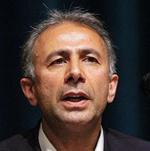Iran and the U.S.: A Battle Over the World’s Nuclear Future
By Ebrahim Mottaqi

2010 has become a, if not the, nuclear year. While Tehran, Hiroshima and Washington are hosting nuclear conferences in April, in May the UN will hold the Review Conference of the Parties to the Treaty on the Non-Proliferation of Nuclear Weapons (NPT) in New York. No official agenda is circulating yet, but it seems the Nuclear Security Summit recently held by Washington will serve as the prelude to the review conference.
The United States—which is trying to develop new models for its global security regime—will undoubtedly take advantage of these conferences as a platform to pressure hostile states and designate them symbols of a global threat, striking for itself a legitimizing posture (as it did with the signing of the START II), and maintaining that it has taken the initial step towards global arms control and disarmament.
Washington’s Nuclear Security Summit in fact had issues broader than the nuclear future of the world and the necessity of nuclear containment under discussion. For the U.S. and its allies, defending the ‘deterrence’ logic in strategic security was the summit’s key concern, while in Tehran at the Iranian sponsored conference all efforts were geared to development of a new set of international regulations.
The Washington summit and the Tehran summit were in fact parallel efforts to promote new paradigms. Clearly, the U.S. and Iran are trying to introduce substantially different rules and regulations regarding global nuclear security.
While Iran promotes all-out disarmament, the United States, France, Russia, China and Britain—all nuclear powers—promote and support deterrence. Global powers seem to have no issues with nuclear proliferation, as long as it does not involve actors from the margin, or the developing and Third World. Iran, on the other hand, has a global outlook and questions the legitimacy of the world powers and their discriminatory policies.
The truth is, of course, that the United States has been the only nuclear power ever to actually use the massively destructive nuclear weapon. Twice. Some may try to justify the Hiroshima and Nagasaki bombings by examining motives in the context of the era in which they occurred, but the tragedy still lingers in the world’s collective memory and renders the U.S. deeply reluctant to repeat the use of nuclear weapons against new, or other enemies.
While the aim of the Tehran conference was to stop the proliferation of nuclear weapons; in Washington, global powers were concerned with arms control and preventing other countries from joining their nuclear club. The two strategic goals could not be more opposed: one comes from the power discourse represented by the U.S., while the other rises from the movement for the enjoyment of peaceful nuclear technology, spearheaded by Iran.
There are thus two substantial world-views challenging each other while the world sits in anticipation, waiting to see which one will resonate more strongly.
The United States—which is trying to develop new models for its global security regime—will undoubtedly take advantage of these conferences as a platform to pressure hostile states and designate them symbols of a global threat, striking for itself a legitimizing posture (as it did with the signing of the START II), and maintaining that it has taken the initial step towards global arms control and disarmament.
Washington’s Nuclear Security Summit in fact had issues broader than the nuclear future of the world and the necessity of nuclear containment under discussion. For the U.S. and its allies, defending the ‘deterrence’ logic in strategic security was the summit’s key concern, while in Tehran at the Iranian sponsored conference all efforts were geared to development of a new set of international regulations.
The Washington summit and the Tehran summit were in fact parallel efforts to promote new paradigms. Clearly, the U.S. and Iran are trying to introduce substantially different rules and regulations regarding global nuclear security.
While Iran promotes all-out disarmament, the United States, France, Russia, China and Britain—all nuclear powers—promote and support deterrence. Global powers seem to have no issues with nuclear proliferation, as long as it does not involve actors from the margin, or the developing and Third World. Iran, on the other hand, has a global outlook and questions the legitimacy of the world powers and their discriminatory policies.
The truth is, of course, that the United States has been the only nuclear power ever to actually use the massively destructive nuclear weapon. Twice. Some may try to justify the Hiroshima and Nagasaki bombings by examining motives in the context of the era in which they occurred, but the tragedy still lingers in the world’s collective memory and renders the U.S. deeply reluctant to repeat the use of nuclear weapons against new, or other enemies.
While the aim of the Tehran conference was to stop the proliferation of nuclear weapons; in Washington, global powers were concerned with arms control and preventing other countries from joining their nuclear club. The two strategic goals could not be more opposed: one comes from the power discourse represented by the U.S., while the other rises from the movement for the enjoyment of peaceful nuclear technology, spearheaded by Iran.
There are thus two substantial world-views challenging each other while the world sits in anticipation, waiting to see which one will resonate more strongly.

